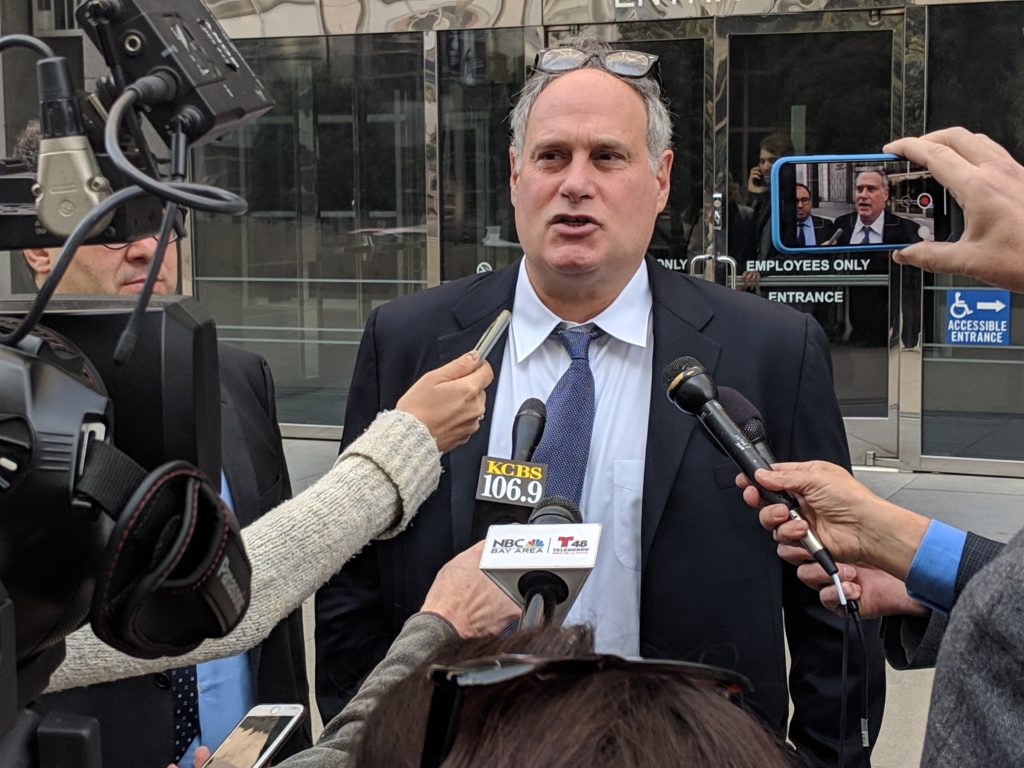Immigration
S.F. Federal Court Blocks Trump’s New Asylum Rules
“What the government really seems to be saying,” a plaintiffs’ attorney said, “is ‘we don’t like asylum.’”

The administration has asserted, in effect, that it can override by presidential fiat a law written and passed by Congress.
Late Monday night, a federal judge in San Francisco issued a temporary restraining order against the Trump administration’s new policy of refusing asylum consideration for refugees who cross the border between ports of entry. The court had heard arguments that morning in a case brought by nonprofit groups serving asylum seekers.
On November 9, President Trump issued a proclamation declaring that for a period of at least 90 days, refugees who cross the U.S.’s Southern border anywhere other than at an official port of entry will be ineligible for asylum. The same day, the Departments of Justice and Homeland Security issued amendments to their own rules governing asylum, to the same effect.
The pronouncements were the administration’s latest move in a longstanding effort to dismantle the United States’ asylum system.
“If this rule is valid,” the judge asked the government’s attorney, “what is left of congressional intent?”
The pretext for the rules change is the approaching Central American migrant caravan, which the president had called an “invasion” and a national emergency in the days leading to the recent midterm elections. In his proclamation, issued just a few days after the elections, the president again stoked fears of the caravan, and argued that compelling refugees to present themselves only at ports of entry will allow for “orderly processing.”
In reality, however, there is less and less “processing” happening at official ports of entry. For the past several months, in violation of both U.S. and international law, Customs and Border Protection has routinely turned asylum seekers away, telling them to come back later or, at some crossings, to contact Mexican immigration officials to make an appointment.
But waiting indefinitely on the southern side of the border is not an option for many refugees from the “Northern Triangle” countries of El Salvador, Guatemala and Honduras, who are fleeing transnational gangs that are also present in Mexico. They also fear Mexican drug cartels that conscript migrants to act as drug-smuggling “mules.” Gay and trans refugees, in particular, face imminent danger in Mexico, where homophobic and transphobic violence is common.
Lee Gelernt, staff attorney for the American Civil Liberties Union who argued the plaintiffs’ case, told the court that in the past 48 hours he had learned that Mexican authorities have been preventing unaccompanied minors from applying for asylum at U.S. ports of entry.
These situations leave refugees who have been turned back by U.S. immigration authorities with little choice but to cross between ports of entry. For them, the administration’s new rules effectively blocked any chance of seeking asylum at all, which, Gelernt believes, is the point. “The government doesn’t want to give asylum to people from the Northern Triangle region,” he told reporters after the hearing.
The Trump administration insists that asylum is a “discretionary benefit,” which administration officials can expand or constrain at will. The plaintiffs — a coalition of civil- and immigrant-rights organizations — argued that, to the contrary, the rules are fixed in plain English in statutory laws that can only be undone by Congress. Under the Immigration and Naturalization Act, refugees may seek asylum “whether or not” they entered the United States “at a designated port of arrival.” The government’s proposed rule change plainly and specifically contradicts this language.
At its heart, the case is a debate over the most basic conception of the separation of powers. The administration has asserted, in effect, that it can override by presidential fiat a law written and passed by Congress. “If the courts allow the president to take this step here,” the plaintiffs argued, “he could not only override statutory asylum law, but disregard the entirety of our congressional immigration scheme.”
Judge Jon Tigar, who presided over the hearing, agreed with the plaintiffs. He analogized the government’s argument to issuing a rule declaring that “you are allowed to come to the federal courthouse in any vehicle,” but then stipulating a second rule saying, “if you come here on a bicycle, you’re not getting in.”
“If this rule is valid,” he asked the government’s attorney, “what is left of congressional intent?”
Judge Tigar took less than a day to issue his ruling granting the temporary injunction. “(I)f what Defendants intend to say is that the President by proclamation can override Congress’s clearly expressed legislative intent, simply because a statute conflicts with the President’s policy goals, the Court rejects that argument also,” he wrote in the decision. The government is all but certain to appeal.
After the hearing on Monday morning, Gelernt characterized his side’s case as involving “serious concerns about separation of powers against the backdrop of an enormous humanitarian crisis.”
“What the government really seems to be saying,” he continued, “is ‘we don’t like asylum.’”
Copyright Capital & Main

-

 The SlickJanuary 27, 2026
The SlickJanuary 27, 2026The One Big Beautiful Prediction: The Energy Transition Is Still Alive
-

 Column - State of InequalityJanuary 29, 2026
Column - State of InequalityJanuary 29, 2026Are California’s Billionaires Crying Wolf?
-

 Latest NewsFebruary 3, 2026
Latest NewsFebruary 3, 2026Amid the Violent Minnesota Raids, ICE Arrests Over 100 Refugees, Ships Many to Texas
-

 Dirty MoneyJanuary 30, 2026
Dirty MoneyJanuary 30, 2026Amid Climate Crisis, Insurers’ Increased Use of AI Raises Concern For Policyholders
-

 Featured VideoFebruary 4, 2026
Featured VideoFebruary 4, 2026Protesters Turn to Economic Disruption to Fight ICE
-

 The SlickFebruary 2, 2026
The SlickFebruary 2, 2026Colorado May Ask Big Oil to Leave Millions of Dollars in the Ground
-

 Column - State of InequalityFebruary 5, 2026
Column - State of InequalityFebruary 5, 2026Lawsuits Push Back on Trump’s Attack on Child Care
-

 Column - California UncoveredFebruary 6, 2026
Column - California UncoveredFebruary 6, 2026What It’s Like On the Front Line as Health Care Cuts Start to Hit

